Post Script. The Welsh Government Five Year Tourism Plan published early in 2020 now includes a commitment to develop a “Welsh Paradore”. See Page 17!
Growing the foundational economy across the South Wales Valleys…
Wales’ City Regions are still in nascent form and grappling with how to address long term and structural socio-economic challenges with limited resources and evolving governance arrangements. The challenges are many and cover: connectivity, housing, skills, the economy, poverty and inequality. In some cases, programmes are moving forward. I am particularly proud of the South Wales metro which begins to address some of the connectivity issues in The Cardiff Capital Region. The recently published CCR Industrial and Economic Plan provides a broad framework for the region – but is perhaps light of specific measures.
Over the last few years we have also seen importance of local economies (foundational and circular) gain a foothold in a broader debate related to economic development and regeneration in places like the South Wales valleys. I admit I was late to “the party” and acknowledge the work of others in this space (like The Foundational Economy); as I set out in my Climate Change “article” I think “local initiatives” can play a role in both helping regenerate the valleys and facing the climate change challenge.
But what does it mean in practice; it seems to me there are not enough well developed ideas with evidence and plans and an oversupply of articulation of the problem. I am also convinced any approach certainly has to be more than a public sector procurement strategy?
So, I apologise, as I am now going to offer another “idea”. However I hope this, whilst not fully developed and perhaps more a “metaphor” for the art of the possible, provides enough of a framework for others to build an affordable proposition around. It is related to tourism and local food.
In doing so I’d like to draw upon my personal experience of a number of short trips to both Italy and Spain. Specifically, my Aunt’s B&B in Casperia in the Sabine hills and Malaga oldtown in Andalucía. Both amazing places in their own right; history, scenery, culture, food and in many cases a different way of living.
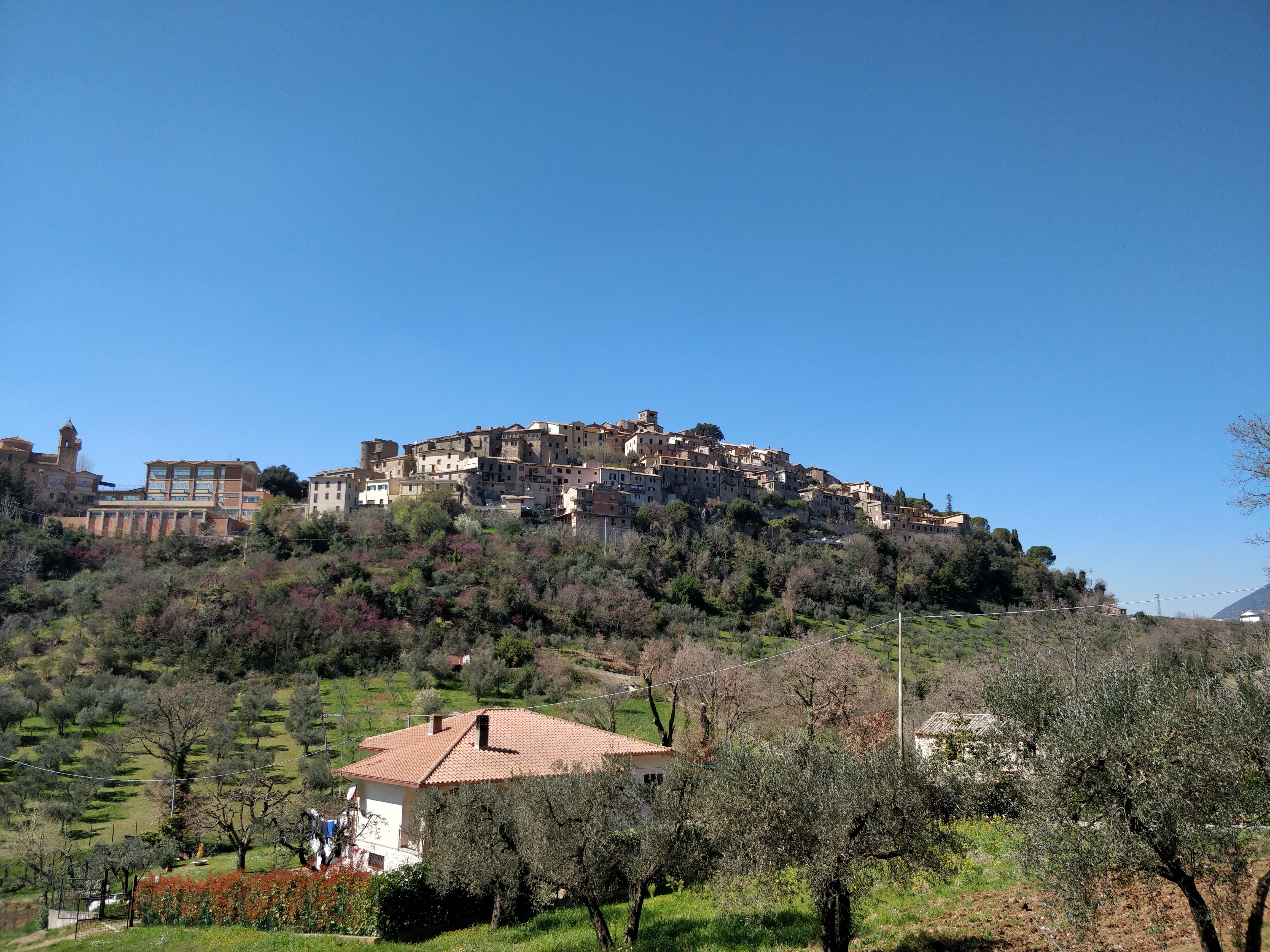
Figure 1 Casperia in the Sabine Hills
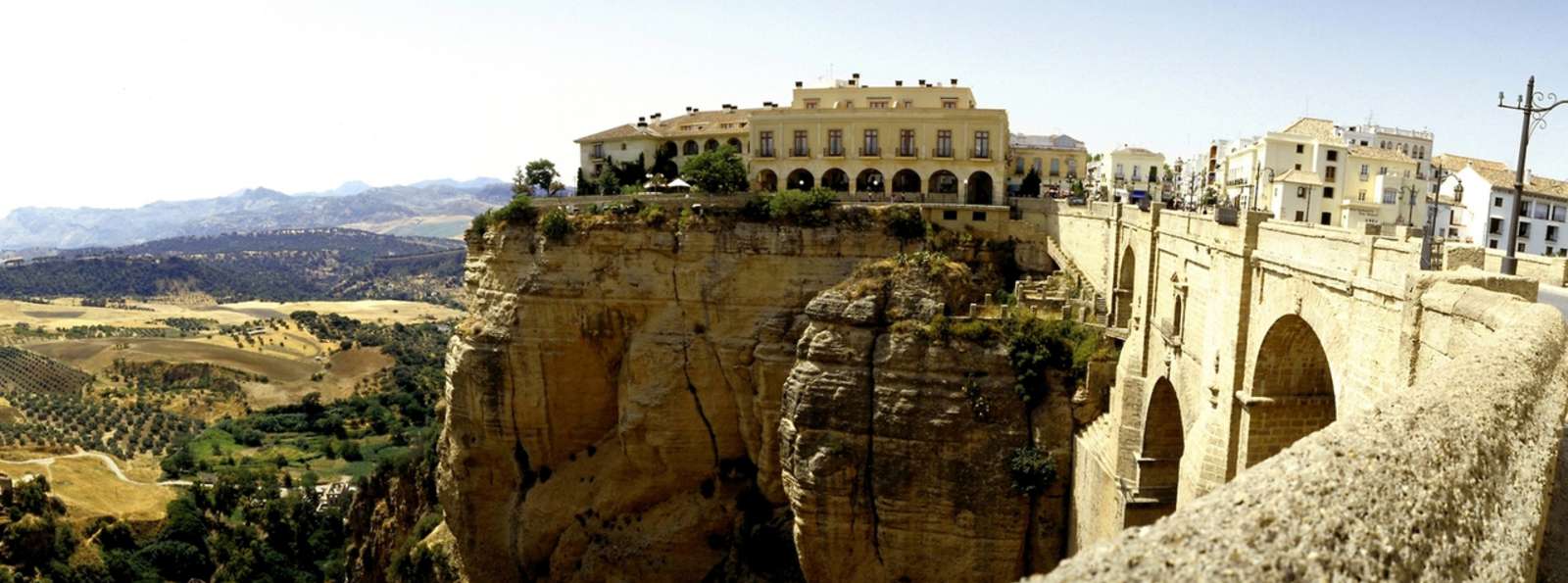
Figure 2 The Parador in Ronda
On Food…
The biggest impact for me is food, there is lots, its good and most is local. My unresearched assertion is that there is, in comparison to the UK, a much bigger local food economy in places like Andalucía and the Sabine hills than equivalent places in the UK. My aunt’s small village and local area, which does not have a huge amount of varied economic activity (and surprisingly has an important but limited tourist economy), does though have strong local food supply chains.
There is clearly a pride in the local produce, and this permeates through everything; the local Casperia Stringozzi (which is a local pasta) festival every August, the local bread, the fresh pasta, olives, the local olive oil, broccoli, cheese, meats, artichokes, there is also local tripe ( which I can’t eat!). I recently attend the Sagra Del Frittello (fried cauliflower festival) in neighbouring Roccantica which attracted coach loads of people from as far as Rome. There is not a great deal of mass-produced processed food anywhere in this region.
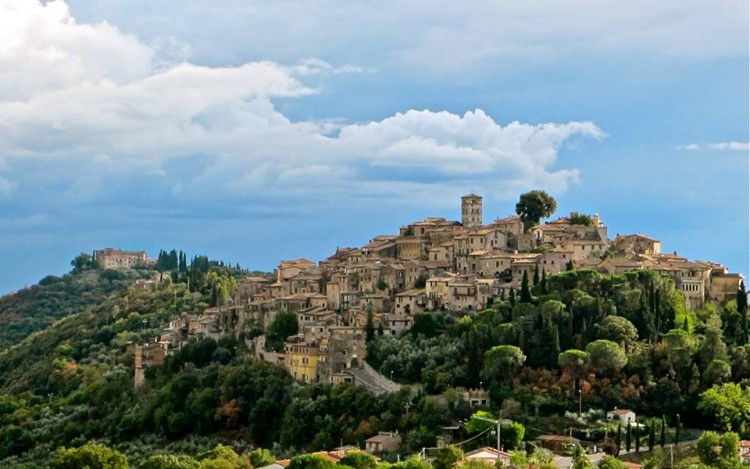
Figure 3 Casperia (La Torretta)
The quality of food on offer in the local market, shops, etc for example in Poggio Mirteto, appears to me to be far better, locally sourced, healthier and very different from that you’d find in a supermarket in Ely or Porth (even with the lovely breakfast I had in the Empire Café recently). People appear to be healthier and more of the economic value is retained locally.
In Malaga the market is a temple to a huge variety of amazing produce – again most local; fruit, vegetable, meat, cheese, olives, olive oil, etc. in a place teaming with people who clearly value its presence as well as the produce on offer.
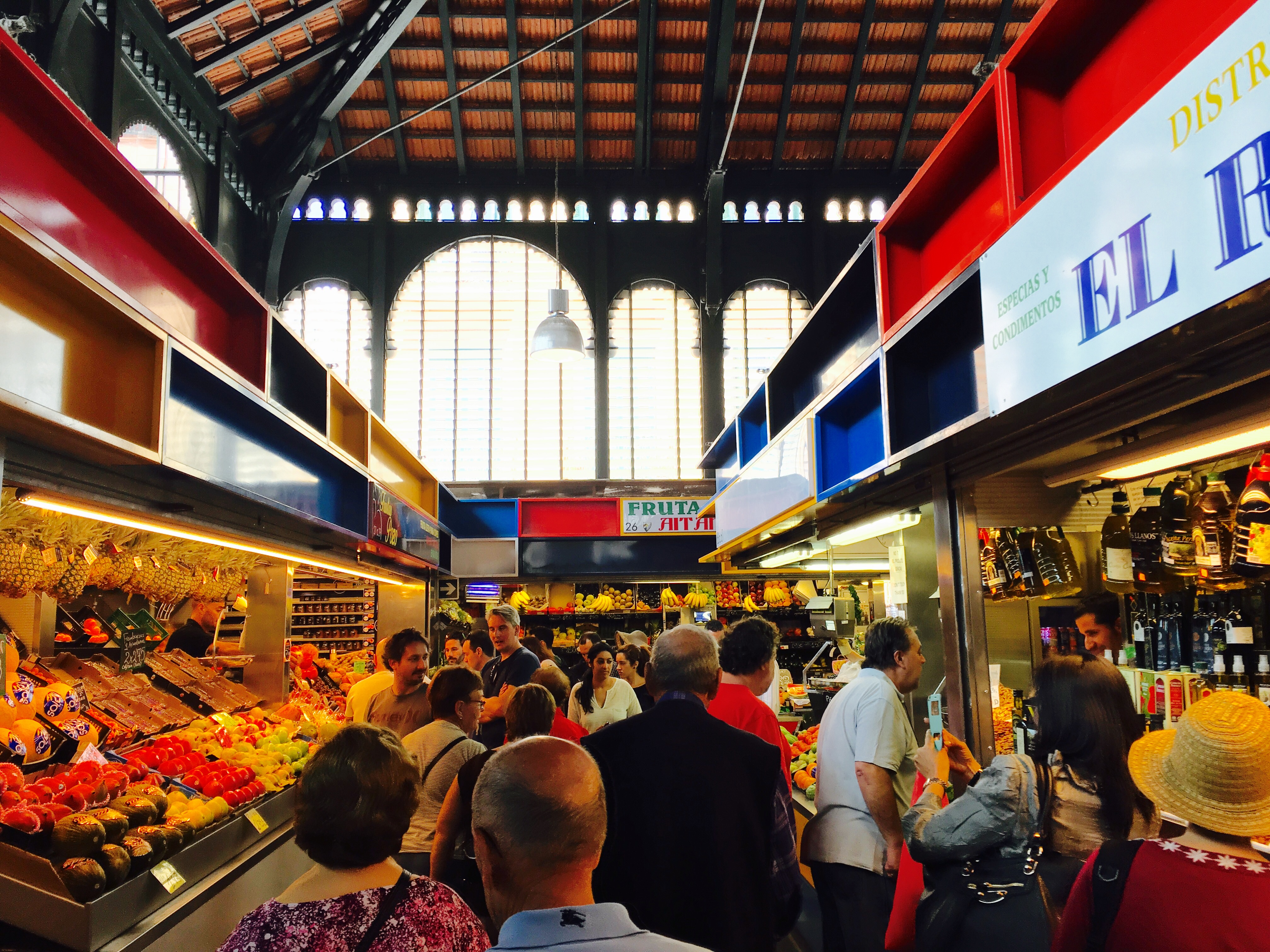
Figure 4 Malaga Market
In both places the local shops contain more local food. The foundational benefits of this allegiance to local food is clear – more of the value is retained locally and supports other activities – shops, cafes, restaurants, etc
In contrast in South East Wales (and the UK in general) we are plagued by far more volume produced processed foods and much more limited local supply. How many high streets still have a local baker, butcher, fishmonger, grocer, etc? The food we do buy and consume is typically produced and/or sold by large corporates, the profits are extracted, and we are left with processed foods that are making us unhealthy.
The lack of more local sources is also undermining our high streets…and this has been happening since Carrefour arrived in Caerphilly in the 1970s. Now we are afflicted with large numbers of “out of town” car based food retail outlets. I am not saying corporate or mass-produced food is all bad, or mass production is all bad…what is bad is our huge overreliance on that to the detriment of our local economies, our high streets and our health.
We also have to deal with the environmental impact of unnecessarily long supply chains that cross-cross the globe and often end in our local supermarkets; with the obvious contradiction of products like New Zealand Lamb being available in a country with perhaps even more sheep than New Zealand!
Supermarkets can also have another negative impact by developing and implementing supply chains and procurement strategies that can often disadvantage small local providers and their local produce. The supermarket shelves are all the poorer because of it.
I am convinced we need to develop and adopt fiscal measures to limit long supply chains and support more local produce.
Tourism
Another thing I like about Spain are the Paradores. These are state run hotels dotted around the country – I have stayed at these in both Ronda and Malaga. They were founded in the 1920s by the Spanish Government to help develop the tourist economy in Spain and are now present across the whole country employing thousands of people.
They are inextricably linked to local culture, including food and are a fantastic showcase for Spain and often based in historic buildings. The tourism offer in Italy is equally well developed. (I can thoroughly recommend a stay at my Aunt’s B&B in Casperia – La Torretta – but try and get a train rather the fly!)
What is our tourism offer?
In the valleys we are perhaps not yet fully appreciative of the potential of the local tourist/visitor economy (day trips and short stays). Yet, we live in a unique urban/physical environment that is visually stunning. When one adds the historical and industrial heritage and the legacy of the coal & iron industry that underpinned the industrial revolution, we have a unique backdrop and a unique story. Yet north of Cardiff and south of the Brecon Beacons there is very limited tourism activity and infrastructure; how many hotels, B&Bs, restaurants, cafes, what local food is there. I don’t want to patronise or undermine the impact of Rhondda Heritage Park, Bike Park Wales and the Cwm Farm shop for example, but I feel we could do a lot more.
So here’s a couple of ideas we can perhaps link.
Firstly, can we develop a Chain of Welsh Paradores?
Like Spain did in the 1920 perhaps the Welsh Government can help establish a chain of “Welsh Paradors”. Perhaps starting with a few pilots in the South Wales valleys before a more ambitious roll out across Wales – I think our tourism offer is “undercooked and would benefit enormously from such an intervention. It could even become a cooperative?
So, can we do this. I think we can and in doing so involve schools, FE colleges, business promotion groups, regeneration agencies. We can also align with other related visitor initiatives – for example the Valley Regional Park concept, Bike Park Wales, Penderyn Whisky and some of the arts culture and community initiatives across the region: Cyfartha Castle, Rhondda Arts Festival, etc.
The “Welsh Paradores” can also be used to help train your people in a range of skills (not just tourism related) including business start up, accounts and business admin; marketing and sales. More importantly, as I suggest below, we can link this to the development of more local food production and consumption. They could even support more local allotments.
I don’t want to undermine the existing providers (like the Blueberry Hotel in Pontypridd) but in places like the valleys there is a “market failure” in an area with untapped potential; such an initiative could help develop new more locally focussed economic activities in the region which will help other local businesses.
The Metro maps of South Wales should signpost all these initiatives
The physical assets required can also help with regeneration of our towns and communities by re-purposing old buildings and driving more footfall into our high streets. For example, let’s assume we develop an initial 5 “paradores” in SE Wales; say Pontypridd, Merthyr, Aberdare, Treorchy and Ebbw Vale. We find tired buildings that could accommodate 20 rooms etc; we refurbish and so provide an anchor for other local regeneration interventions such as RSL renovations of high street property to deliver more rental homes. There are certainly others – we need to think across disciplines.
Secondly – can we link to local food?
More strategically I think we can link a “Welsh Parador” local tourism/regeneration initiative to local food production and supply.
I dont want to sound patronising – but I do think we could do a lot more to encourage a greater provision and take up of local food. Some of this may require more imaginative but perhaps harder to deliver, fiscal measures to discourage volume produce and processed foods and better support local independent providers (I think a review of business rates could help).
A couple of years ago I penned a short article called “Hand Made in Ebbw Vale”. Drawing from that perhaps we could direct some city region money to develop our local food economy. This article by Sally Hughes is also worth a read in relation to a “sharing economy”.
So if I may, I’d like to offer a rather simplistic proposal – based on bread
Like we all need a haircut once in a while (even me), we all eat bread, but most of what we buy is mass produced far away and the economic value extracted form the place of sale or consumption.
So let’s train a 1000 bakers, to actually make bread. Then we then need to find locations and drive some subsidies to help set up such businesses. We also need a marketing campaign to sell the virtues of local food. This should involve those small business already operating in the sector, schools, FE colleges, community groups, etc. If we want to break the habit of processed pasties and volume produced white bread, we need to start somewhere.
To secure some synergies, it may be more effective to integrate this initiative with the” Welsh Parador” and co-locate baker training facilities at each of our new paradores. Once qualified we can release our young bakers with business support to try and set up on their own (with the right mentoring and support in place). Many, if not most, will fail; but some might succeed. My hope is that in 20 years every high street in the region has a local, independent baker that is used by the community and which engenders a sense of pride in local food.
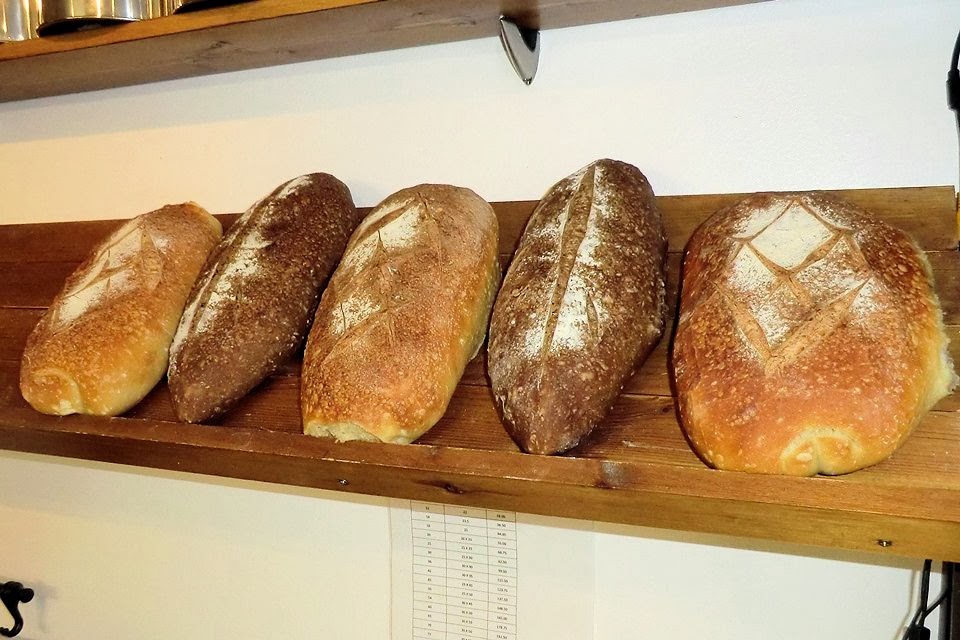
Cocorico Bread
Ok its sounds idealistic and there are a whole bunch of issues and obstacles – not least on the demand side. However, it’s what we used to have until the 1950s and in places like Cardiff we are seeing the emergence of more local bakers, Crickhowell is also bucking the supermarket trend. We are also seeing the emergence of microbreweries across the region.
That’s why perhaps, we should wrap this initiative into a broader programme that sees more support and investment in our local markets and farmers markets – Newport, Pontypool, Pontypridd, Cardiff, Maesteg, etc
I can hear some of you muttering now! Let’s avoid the knee jerk and I suspect negative reaction by many, to the very idea of trying to encourage “expensive” hipster bread from Cardiff to be taken up in the valleys.
The reality is that the “expensive” sourdough loaf I bought at Cocorico yesterday was sold at a price more reflective of the true cost of production vs those mass produced white sliced loaves which benefit from massive economies of scale. I would argue it’s our transition over the last 50 years to such mass produced products with long supply chains which have and our continuing to damage, local economies as well as our natural environment.
We have to find wasy to fiscally support the small, local and independent operators so they can produce and sell their produce on a more competitive basis Vs the likes of Tesco, Greggs, etc all over South Wales. We also actually need to learn from places like Crickhowelll who have protected themselves somewhat from the impact of corporate food supply; similarly how do we support and encourage initiatives like the Cwm Farm shop in Treorchy and the Chain House in Pontypridd who champion local produce. There are other. PS: The recent announcement that Treorchy won the “best high street in the UK” award recently is hugely positive; esp. given Crickhowell had won the previous year.
More challenging we also need to grapple with how do we, as customers, re-programme our expectations and re-connect with local food culture (like in Casperia) that would also help retain more economic value in our communities.
Given the issues and challenges we face can I ask that WG & CCR find some resources to put a team together to explore how we can develop a more sustainable local food economy across the region and link its delivery to the Welsh Parador idea.
I dont claim to have anything like the understanding of this sector as other academic experts and certainly those already active in the industry. But any WG or regional initiatives needs to engage people who both “know” and “do” in this space.
From Cardiff University can I suggest the likes of Professor Sonnino who is internationally recognised authority in food geographies and an advisor to the European Commission and as well as the United Nations Food and Agriculture Organisation. We should also engage the like of Prof Kevin Morgan , Prof Terry Marsden and Dr Adrian Morley who were authors of the 2016 report, “Food Policy as Public Policy”, and Prof Milbourne Head of the School of Geography and Planning.
As important, we also need to engage those already involved in delivering high quality local food and tourism products in the region to help direct and de-risk any programme. For example this expert group could include those involved in the Cwm Farm Shop, Cocorico, Brod, Chain House, Bike Park Wales, etc. We should also engage those involved in the various farmers markets across the region (e.g. in Cardiff) as well as the key operators of places like Pontypridd market. There is also a key role for our schools and colleges, especially Coleg Y Cymoedd in relation to skills and training; groups like The Princes Trust, The Bevan Foundation, etc could also help. We also certainly need to engage expertise from groups like Foundational Economy and engage with Welsh Government’s Foundational Economy Challenge Fund.
What do we do?
In the first instance someone needs to draft an outline plan / proposition that sets out:
- What we are trying to achieve?
- What needs to be done?
- Who needs to be involved?
- What will be delivered?
- When it will be delivered?
- How much it will cost?
- The benefits to the local economy?
Anyone?
So yes, this idea is a metaphor; but I think worthy of serious exploration. I’d also like to see us making pop in Porth again! Can we arrange that as well?

PostScript…
My Welsh speaking neighbours have been trying to come up with an appropriate Welsh name for our Paradors (or is it Paradores?)….. how about:
Hafod Cymru – summer houses wales
Gwesty Pobl – people’s hotel
Seintwar – sanctuary
Tlws Cudd – hidden gem
Cysgod Hanes – historic shelter
Ysbryd – spirit
Plas – Place
Any others….??
